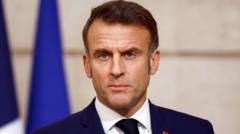French President Emmanuel Macron has announced that he will appoint a new prime minister "in the coming days," following Michel Barnier's resignation after a historic no-confidence vote in the National Assembly. In a ten-minute national address, Macron rebuffed calls for his resignation, pledging to fulfill his duties until the end of his term in 2027.
The political landscape has become increasingly complex as Macron engages in negotiations with various political factions. He initially met with leaders of the Socialist Party, who expressed a willingness to compromise on forming a "fixed-term" government, rejecting any candidates from right-wing parties. The Socialists were part of a broader coalition, which also includes leftist and far-right lawmakers, who successfully voted out Barnier just three months after his appointment.
Describing the parliamentary vote as "unprecedented," Macron thanked Barnier for his service and criticized the opposition for what he called an "anti-republican front." This no-confidence vote is particularly unique, marking the first time a French government has been removed by parliament in over sixty years.
In light of the current political deadlock—stemming from Macron's decision to initiate snap elections—the National Assembly is now divided amongst three primary voting blocs: leftists, centrists, and far-right members. For the new prime minister to have a chance of lasting tenure, it will likely be necessary to gain the cooperation of some leftist factions, including the Socialists.
On Friday, Macron reached out to political leaders, including centrists and Socialists, aiming to build a government of "general interest." The Socialist leader, Olivier Faure, expressed openness to discussions but made clear he wouldn't support the continuity of Macron’s vision without considerable concessions. However, the far-left faction within the New Popular Front reportedly did not authorize Faure to represent the group's stance.
Reacting to Macron's comments, Marine Le Pen, the leader of the far-right National Rally, insisted that the censure motion, which led to Barnier's ouster, was a constitutional right rather than a disruption of the republic. Following Barnier's resignation, he will serve as a caretaker alongside his ministers until a new administration is formed, shortly before a significant event— the opening ceremony of the rebuilt Notre-Dame Cathedral in Paris— attended by international leaders.
Speculative discussions about potential candidates for the prime minister role include Defence Minister Sébastien Lecornu and Interior Minister Bruno Retailleau, among others. Macron has yet to indicate his choice but has stated that managing the budget for 2025 will be a pressing priority for the next government.
The current turmoil in French politics not only highlights internal challenges faced by Macron's administration but may also have wider implications for Europe, as political observers track how this scenario develops against the backdrop of upcoming presidential elections and significant international events.




















